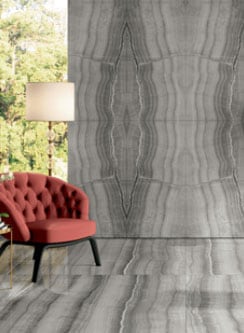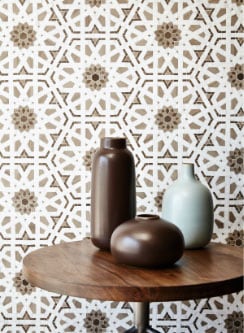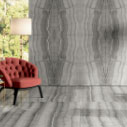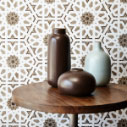
Slab Care and Maintenance
Know Your Stone
It’s hard to beat the durability of natural stone. The natural hardness of stone made it an easy choice for the world’s first building material, and millennia later, it is still prized for its enduring beauty in architectural design.
However, even though a stone surface may be millions of years old, it will still require care and maintenance in order to keep it looking beautiful for a lifetime. In order to protect and preserve its surface, we must understand the characteristics of the type of stone from which the slab was cut.
Each type of stone – whether natural like marble, granite, quartzite, onyx, dolomite and others, or engineered surfaces like quartz, porcelain, or sintered stone – has its own unique characteristics that determine how it must be cared for. And almost all of them require some degree of care and maintenance in order to continue looking their best.
Natural vs. Engineered
Without question, modern materials science and technology has come a long way in improving upon natural stone. In fact, engineered stone slabs are able to outperform natural stone in many ways, but yet still cannot fully match its inimitable natural beauty.
So, what most sets engineered stone apart is its lack of required maintenance. Unlike natural stone, engineered stone products such as quartz, porcelain, or sintered stone are non-porous. This makes them almost impervious to staining, one of the primary maintenance concerns of natural stone.
Engineered slabs are harder than most natural stone slabs, rating a 7 or higher on Moh’s scale of mineral hardness. This makes them much more resistant to scratches or marring. Some sintered stone products are so hard that they require special tools to cut and shape. Products such as these are uniquely maintenance-free, and can even be applied to exterior surfaces, such as building cladding. But they generally fall short of capturing the unique charm of marble and other natural stones.
Marble Care & Maintenance
Marble was the first truly decorative stone to be used architecturally, and it remains one of the most popular natural stones used today. But it is also the softest. Most marbles rate about a 3 on Moh’s scale, which makes them only slightly harder than your fingernail.
So, the first thing to remember is to NEVER use any abrasive cleaner of any kind on a marble surface. But that’s not all, you’ll also need to avoid any harsh chemical cleaners such as bleach or ammonia because they can damage your protective coat of sealant.
As mentioned above, natural stones like marble are porous, so they need to be sealed before use. Most marbles are sealed prior to installation, but sealant will wear off over time. It’s recommended that marble and other natural stones be treated at least once a year with sealant, which is simply applied by spraying it onto the surface, rubbing it in, and then wiping away any excess sealant.
To keep marble clean, it is recommended that only mild soap and water be used. When cleaning, be wary for any areas that darken when moistened, a sure sign that the marble needs to be re-sealed. Allow the surface to dry fully before applying sealant.
Granite and Quartzite Care & Maintenance
On the other end of the hardness spectrum are granite and quartzite, both rating about 7 on Moh’s scale. This makes them far more resistant to scratching than marble, but you should still avoid using abrasive cleansers or cleaning products on them.
Instead, Walker Zanger recommends treating ALL natural stone slabs the same way:
Seal them well before use, and re-apply sealant at least once a year.
Keep them clean using only a soft sponge and mild soap and water.
Never use harsh chemicals or cleaning products such as bleach, ammonia, isopropyl alcohol or paint thinners on them.
Do not use abrasive cleaning products or tools on them.
Do not allow liquids of any kind to pool or remain on the surface for more than a few moments.
Do not allow rustable metal surfaces to remain in contact with them for prolonged periods.
Even though natural stone slabs are heat-resistant, it’s recommended that you always use trivets and avoid placing hot pans directly on the stone surface. Even though the stone will not burn, sealants that have penetrated deep into the stone can become discolored, leaving stains that are extremely difficult to remove.
Care for Tile Products
For the most part, the same concerns and guidelines that apply to stone slabs also apply to tile products. Not only does natural stone tile need to be regularly sealed, but so does the grout that surrounds them. And since grout is even more porous than stone, sealant may need to be re-applied more frequently, especially in areas around sinks and showers.
Most ceramic tiles are glazed, making them as waterproof as porcelain. But even though they are impervious to water, the grout around them is not, and will need to be thoroughly sealed, especially if they are applied to areas where moisture is commonplace.
A Little Care Goes a Long Way
For the most part, the same concerns and guidelines that apply to stone slabs also apply to tile products. Not only does natural stone tile need to be regularly sealed, but so does the grout that surrounds them. And since grout is even more porous than stone, sealant may need to be re-applied more frequently, especially in areas around sinks and showers.
Most ceramic tiles are glazed, making them as waterproof as porcelain. But even though they are impervious to water, the grout around them is not, and will need to be thoroughly sealed, especially if they are applied to areas where moisture is commonMost people seem to find that the uniqueness and beauty of natural stone are definitely worth a little extra care and maintenance. After all, it only requires taking common-sense precautions, re-applying sealant regularly, and cleaning with only mild soap and water to keep natural stone slabs looking pristine and gorgeous for a lifetime.
Still, before you choose natural stone slabs to use as countertops, walls, or flooring in your next design, you should make sure that you fully understand the care and maintenance your choice will require.
place.


















